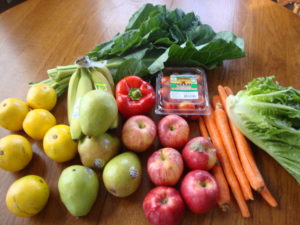Jessica’s note: This is a guest post by my mom! So many times in my life, my mom’s words (written or spoken) have been life to me. They’ve given me guidance when I’m confused, encouraged me when I was down, given me hope when things were bleak. I hope her words here – on the simple, yet often exasperating topic of mealtimes – will do all of these for you. Thanks for sharing, Mom!
Win the Mealtime Battle: No-Fail Method To Raise Healthy, Happy Eaters
If you are struggling with a non-compliant eater, and you just don’t know what to do, don’t worry.
Many moms before you have overcome this challenge, and you can too! The good news is that you really can change your child’s diet and make eating a healthy and enjoyable activity. It only takes self-control, determination, and a very competitive spirit.
I know that some days, there are not many of these qualities left in you past 9am. But you can’t opt out of mothering, and since you have to keep on going, here’s some advice.
You have to decide that this is a challenge you can and will win.
You will need to mentally prepare yourself for the endurance it will require. You will need to anticipate the opposition you will face. And, most importantly, you must be ready and willing to face the consequences of living with an unhappy toddler.
If this sounds like you are preparing to do battle, then you are getting the message. But the good news is that there is a very simple battle plan and anyone can use it.
Here it is in a nutshell:
- First, you have total control over what food your child is given.
If you have a toddler or preschooler, odds are they don’t help themselves to the refrigerator or pantry, which means that you give them their food.
Think really hard about that.
You are in total control of what purchases are made at the grocery store. You drive the car to whatever restaurant or drive-through you choose. You cook the meals and put food on the table. You choose the snacks and dole them out when you want to. He may choose not to eat what you give him, but he cannot provide himself with other choices. If you don’t want your child to eat cheese puffs, don’t buy them. You really are in the power seat!
- Secondly, understand that your child will not starve himself or suffer permanent damage if he misses a meal or goes to bed hungry.
I know it seems harsh, but sometimes you may have to let your child get really hungry.
Remember that ultimately, you want to help him develop good eating habits that will stay with him even when he gets to make choices for himself. If a temper tantrum or crying fit results in fruit loops instead of that healthy whole grain muffin, your child is the loser. First, because he missed out on a healthy nutritious meal, and secondly, because he learned that his negative behavior may get positive results.
So how do you put this simple plan into action?
- First, you must know what a healthy diet looks like. I won’t go into the nutritional aspects here, but many of the mommy bloggers offer great advice on healthy diets. Do your homework. Know what your child’s nutritional needs are, and shop so that your kitchen is full of good and only good choices. {Jessica’s note: Here is a terrific blog post on healthy meal ideas.}
Don’t hesitate to throw out or give away those foods in your kitchen that might cause problems. For example, if she only wants fruit snacks for breakfast, give them away. It’s so much easier to say “no” when saying “yes” isn’t an option.
- Secondly, customize meal time to suit your child. I’m not suggesting you allow them to make the choices. What I am saying is that we are all different.
Some kids wake up famished and need a big hearty breakfast as soon as their feet hit the floor. Others need a little time to wake up and maybe a morning cuddle is necessary to get their tummies rumbling. Some children need to eat every few hours, and in my experience, this is pretty much universal for children. But then there are those exceptions: kids who just want three meals a day and, “don’t bother my tummy with anything more.” Know your child’s eating style and work with it.
- Next, make mealtime pleasant. Who wants to eat with a grumpy woman who plops down food then picks up her phone to complain to anyone willing to listen about what a terrible day she’s having?
I know some days are exhausting, but what you are doing as a mother is extremely important. Remember what I said about self-control, and determination?
This is where you need it. Determine that you will stay cheerful and pleasant throughout mealtime.
- Lastly, consider your child’s individual taste. There is nothing wrong with preferring whole-grain toast over oatmeal. Some children like crunchy food, some prefer soft. Some like to eat cold or room temperature food, and some want everything as hot as their little mouths can stand. Some children have large appetites, while other little tummies just don’t need much to be satisfied.
Once you have identified your child’s individual eating styles and tastes, you can make a list of foods that will provide good nutrients and the proper balance of fat, carbs and protein. With list in hand, you will be ready to put your plan into action.
{Side bar….I know there are many different theories on what is good and healthy: gluten free, dairy free, vegan, etc. Don’t be hung up on the particular foods I mention. Remember, I am not focusing on the diet now, I am concentrating on techniques for developing healthy attitudes towards food and mealtime!}
Okay, now that you have your goal of healthy, happy mealtimes, let’s run through a possible scenario:
You hug your little one and tell them what a wonderful day it’s going to be.
You put them in their seat for breakfast and give them your full attention.
Ask them if they see the sunshine, or do they see rain clouds? For younger babes, even though they may not understand everything you say, they do understand that you are happy and interested in communicating with them. At this point you might tell them what yummy things they will be having for breakfast or ask them what they smell. The point is, if you set the tone of happiness at the table, it will be contagious.
When you put the plate down in front of them (or offer the first bite from a spoon) you can tell them about what you’ve made. Did it come from a tree? Did a farmer grow it? Get the idea?
Eating is fun, and it is social.
Now if you have a very difficult eater, they may have thrown the plate on the floor by now or spit the oatmeal all over your shirt.
Remember self-control? This is where you pull it out again.
It might look something like this: “Food doesn’t belong on the floor. Let’s clean that up.” Put him down from his chair and clean up the mess. He may or may not want to help, but just ignore negative behavior and stay positive. Then you might just clean off the table and say, “we’ll eat later.”
Or, you may have a whiner. He doesn’t want bananas on his plate, he wants grapes. Not that cheese, he wants the other kind. With this guy, you might try something like this, “This is what we are having for breakfast this morning, and, wow, did you see that big bird that just flew by the window?” “Oh, what’s that? You don’t like brown bread? Perhaps tomorrow we can find some blue bread. Yes, I am being silly, I have never seen blue bread either…”
Remember what I said about competitive spirit? You can win this thing! You have the keys to the kitchen. It’s all in your hands. Just stay positive, smile and don’t give in. You are showing your little one that you love her, and that you will satisfy her hunger needs, but you are the boss. You are kind and loving, but still the boss.
Whenever you decide that the meal is over, either because they have eaten it or refused to eat it, take your child away from the table with a smile. Please don’t threaten with: If you don’t eat I’ll…Or, since you didn’t eat you can’t… Once the meal is over, it’s forgotten.
But! If your little guy refused to eat his breakfast, there is absolutely nothing wrong with offering it for lunch. If you just can’t bring yourself to do that, I understand, but don’t offer snacks or treats in between meals unless the plate was cleaned.
And don’t allow them to fill their tummies with juice! Water is a very necessary part of good health, and an important subject in itself. There are many creative ways to encourage your child to drink lots of water. Make it a priority.
Each meal should be a happy, social experience. This is not the time for catching up on your reading or texting your husband. Focus on engaging your child. Sit down and eat with them.
Remember, children learn by example, so you make healthy eating choices too! Talk about your foods. Tell them what each food does for the body. Kids love to know that protein builds muscles, and milk helps their bones get big and strong. My mother always told me that carrots made my eyes sparkle and I still think of that when I munch them.
You are making memories and you decide if they are sweet or sour. Please choose happy ones.
Ok, you have chosen healthy foods, you have made mealtime a happy time. Now what will help get the food from the plate to the tummy?
Here are a few ideas:
- One idea that has been helpful is to use a plastic muffin tin as a plate. Put a small amount of healthy food in each little cup and let the child eat what she wants. Put in a variety of foods, even if it is just one or two bites of a new food. And if one green bean or two little peas are eaten, don’t forget to praise them for trying something new! If she doesn’t finish everything, you can offer the tray later. When all the little cups are empty, fill them with foods for the next meal.
- Or, you can cut foods into fun shapes. Remember carrot sticks lined with peanut butter and raisins? My grandsons love “Giant Raisins” better known to grownups as prunes. You might also try counting games…1 carrot 2 peppers 3 cheese cubes 4 blueberries. Be imaginative. Have fun.
The difference here is that you control the choices. No junk on the plates means no junk in the tummy.
And there is no need to bribe or plead with your child to eat! If they don’t choose to eat, happily put them down from the table with a smile. I promise you that eventually they will be hungry and that chopped apple and turkey breast will look like a feast fit for a king!
One of the very good side effects of healthy eating is that children develop tastes buds that enjoy good, healthy food. Can you remember how sweet a ripe juicy orange tastes? But if you have eaten a cookie just before you taste that orange, your mouth is fooled into thinking that the orange isn’t sweet at all. When you feed your children fresh vegetables, they can learn to appreciate the flavors. If their tastes buds have been dulled by high salt and sugar laden foods, the poor little buds just can’t enjoy the taste of real food!
It may take several weeks or even longer, but your child will learn to love meal times and good food. You are building habits for a lifetime, and it can’t happen overnight.
Just don’t give in to whining, tantrums or hunger strikes. Remember you are determined to have a healthy child. Stand firm. Some children enjoy a good joust and for the moms of the jousters, you must persevere. You can win this. Remember, you buy the food so you control what goes on the plate! As much as he loves the joust, he eventually will have to put down his lance and eat.
So, let’s review:
- You choose to buy and prepare only healthy foods.
- You set the mood with a smile and a positive happy attitude.
- You are sensitive to your child’s individual style and tastes, and serve appealing and healthy foods.
- You react positively even and especially when they don’t. You have self-control.
- You are armed with determination and you will prevail.
- You win, because a happy healthy child makes everyone a winner.
Are mealtimes ever a struggle for you and your child/children? What would you change about your family’s eating habits if you could?
If you liked this post, consider following “Smartter” Each Day on Facebook or Pinterest!
Follow "Smartter" Each Day on Facebook!
Follow Jessica on Instagram!
Want my "Favorite Things" newsletter?
I hate lots of annoying emails, so I won't send them! Just motherhood + life tips, a few times a month.








 Follow
Follow












So many good tips 🙂
This really is one of the best articles I’ve ever read on picky eating. I’m so glad you got your mom to write this!! We do so many of these things and the result is that when my kids are picky, they’re choosing applesauce instead of yogurt or an orange instead of a banana. One child likes white cheese and the other likes orange. And those are choices that I can definitely live with!
She definitely knows what she’s talking about! She’s raised some healthy eating kids and grand kids! So many great tips! Hope I’m up for the challenge!
I know this is an older post, but…I used to work as a behavior therapist for young children. One thing to remember is to be SURE to praise every success and to make sure that the praise is inversely proportionate to the amount of resistance you encountered for that bite/food. For example, taking a bite of a new food without any fuss deserves a PARTY. Taking a grudging bite after 5 minutes of whining might deserve a simple “thank you.” This is called “differentiated reinforcement” and is very effective.
While I agree with most of this, I simply cannot agree with not giving snacks unless they clean their plates at mealtimes. I don’t think that a child should be punished for not eating when you think they should be hungry. I don’t think that they should be allowed to get up from the table after eating nothing, then have whatever snack they want – however, if they’re not hungry at mealtime, then save it, and offer it to them if they get hungry later. We have done this many times with our son, and he has actually eaten the food later – when he is actually hungry! Children should be allowed to listen to and respond to their internal hunger cues- if they don’t “clean their plate” during meals (or don’t eat anything), I don’t think they should be punished and made to go hungry until the next meal. As someone who is diabetic, and also as someone who has always had blood sugar issues, this is a very dangerous and unhealthy practice. How would you like it if you had a decent breakfast, but by the time lunch rolled around, you weren’t terribly hungry, and someone said, “Well, since you didn’t eat lunch, you have to wait until dinner to eat anything else!” Yes. It’s absurd.
Thanks for your comments, Libby! This article was actually written by my mom. I’m glad you gave me the chance to correct these thoughts. I agree with what you’re saying, and she would, too! Absolutely give them a chance to eat their dinner later, and for a kid who eats a good meal, I do allow snacks. I think she was trying to say that if you’re currently having eating struggles with someone, perhaps eliminating snacks is a good thing to try.
As an addition to my last post – you might think, “Well, if they’re hungry, and don’t eat all day until dinner, then they’ll learn to eat at mealtimes.” Let me correct you – what really happens is they will learn to eat WHEN THEY’RE NOT HUNGRY. I’ve seen this happen with other people’s children – and that leads to overeating.
Jessica – I think most of your readers found this helpful!
PS It is rude to be negative if you didn’t even read the post in its entirety, Libby. Here is a direct quote from the post: “But! If your little guy refused to eat his breakfast, there is absolutely nothing wrong with offering it for lunch. If you just can’t bring yourself to do that, I understand, but don’t offer snacks or treats in between meals unless the plate was cleaned.” She doesn’t say your children can’t eat at all in between meals – just not snacks and treats. She clearly says to offer them food if they are hungry.